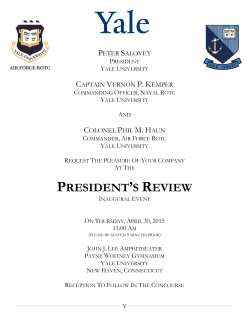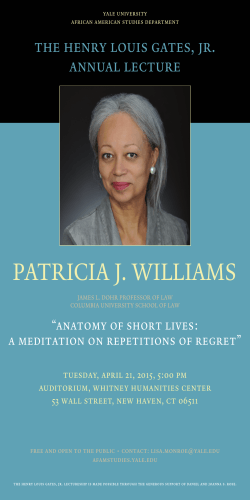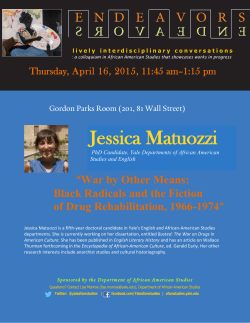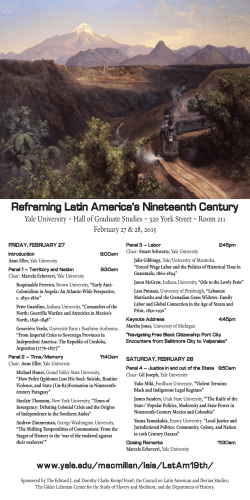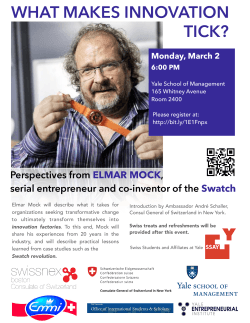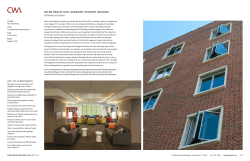
xyua_book_5_lm_forwiki - Yale University School of Art
Undergraduate Art @ Yale Undergraduate Art @ Yale P.06 Welcome P.14 The Mission P.18 Notable Alumni P.24 Courses P.38 Statistics P.42 Members of the Yale Art School Faculty Teaching in Yale College 2013–2015 P.49 Yale Summer School of Art and Music in Norfolk, ct P.53 Edgewood Gallery P.56 Visiting Artists P.64 School of Art Facilities P.68 Applying to Yale College The program in Art offers courses in a variety of media that provide a background in visual arts as part of a liberal education and as preparation for graduate study and professional work. In 2013, twenty-five art majors graduated from Yale College. A student show at Edgewood Gallery. Welcome . . . PROS P E C T I V E S T UD E N TS , to the School of Art, one of Yale’s thirteen professional schools in which undergraduate courses are taught alongside graduate programs. The art school has been in existence at Yale since 1869, when the Yale School of the Fine Arts opened; it was the very first art school connected with an institution of higher learning in the country. We also had the first university art museum as early as 1832 with the Trumbull Gallery. Since then, the School has had a long, distinguished history of training artists of the highest caliber, from Beaux Arts training those first decades, to the Bauhaus influence of the 1950s with Josef Albers at the helm, to the multidisciplinarity of today, at a school where acclaimed curator and artist in his own right, Robert Storr, works to create a forward-thinking, moving (and shaking) place for creation Faculty participate in a Senior Thesis review in Green Gallery. and expression. The program in art offers majors and non-majors alike courses in four concentrations and a variety of mediums that provide a background in visual arts as a valuable part of a liberal education and also as preparation for future practitioners. The areas of study are painting, sculpture, graphic design, photography and filmmaking, with plenty of wiggle room to make work in the interstices, such as video, animation, installation and sound. 8 In the university setting, the introduction of the arts to those in other fields is invaluable; learning the nitty gritty of making art helps you to better understand, value and support the arts in society. The School of Art is a lively place where hard work and cross-pollination produce students who will go on to have the study of the visual arts as an influence for decades, whether they ultimately decide to be practicing fine artists or people who make art a part of their lives in some meaningful way. In my time here I have seen a fair number of art major alumni who have gone on to become doctors, but whose experience making and seeing and looking closely and thinking about art here at Yale changed the way that they saw the world, opening eyes and doors. Clearly, a student does not have to be a major to learn something important here. 9 UN D ERG RAD UATE ART @ YALE This is a place to experience and work at experimentation, problem creating, problem solving, collaboration and finding your voice. It is a place for making things with your hands and Critic Joshua Chuang speaks to a black-and-white photography class at the Yale Art Gallery’s Prints, Drawings and Photographs Department. learning how to talk about it. The arts end of campus is full of places to make this happen, from the high-end photography and graphic design facilities in our main school in Green Hall, to the painting and printmaking studios in the Crown building and to the spacious sculpture and multidisciplinary studios in the Edgewood building around the corner. There is a vibrant student gallery as well as a freestanding rotating gallery of contemporary art curated from work by the top artists working today, and the School is just down the block from the Art History department’s Loria Center, the School of Architecture, the Haas Arts Library, the British Art Center and the famed and newly fully-renovated Yale Art Gallery, as well as several theaters that are part of the School of Drama. 10 W E LCOME just a few minutes’ walk away, as is the Center for Design and Engineering at the School of Engineering, where art students have access to collaborate on projects with engineering students with 3d printers and other digital fabrication machines. Our students are never empty-handed. There is always something to inspire you here, and always a working artist faculty member or renowned guest critic (or two or three) to push you further, to make the work that best communicates just what you are trying to say. Peers and teachers will offer criticism and encouragement; they will test, and prod, stimulate and provoke creativity in a range of media. This is Yale, and this is the School of Art, where the tools are here waiting for hands and minds from all backgrounds to pick them up and find new ways of using them. It is up to each of you, young artists, to figure out what to do with them. L I SA K E R E S Z I , Critic, MFA 2000 Director of Undergraduate Studies 11 Lisa Kereszi and Lecturer Benjamin Donaldson take students on a field trip to a local museum. The Beinecke Rare Book Library is another fantastic resource right A student’s sculpture in an exhibition space in the 36 Edgewood building. Lecturer Brent Howard participates in a Final Review of a sculpture student’s thesis work in Green Gallery. “How artists discover their vocation differs as greatly as the places they come from, the support they got or failed to get along the way, and the kinds of things they are doing when they first recognize themselves in something they have made.” — RO B E R T S T O R R , D E A N , YA LE SCH OO L O F ART . . . O F T HE YA L E SC H O O L O F A RT is to provide students with intellectually informed, hands-on instruction in the practice of an array of visual arts media within the context of a liberal arts university. As a part of the first institution of higher learning to successfully integrate a studio-based education into such a broad pedagogical framework, the Yale School of Art has a long and distinguished history of training artists of the highest caliber. A full-time faculty of working artists, in conjunction with a diverse cross section of accomplished visiting artists, collaborate to design a program and foster an environment where the unique talents and perspectives of individual students can emerge and flourish. The School of Art is founded on the belief that art is a funda- A senior installs his photography project. mental force in national and international culture, and that one of the primary standards by which societies are judged is the quality, creative freedom, critical insight, and formal and technical innovation of the visual art they produce. The Yale School of Art teaches at the graduate and undergraduate levels, and consequently the student body consists of those whose primary or exclusive focus is art as well as those for whom art is an essential part of a varied course of inquiry. The school currently offers degrees and undergraduate majors in the areas of graphic design, painting/printmaking, photography, filmmaking, and sculpture. 16 17 UN D ERG RAD UATE ART @ YALE THE MISSION A painting student works in her studio in Green Hall. Acclaimed Yale Alumni Frederic Remington 1900 B FA Reginald Marsh 1920 B FA Claes Oldenburg 1950 B FA Ivan Chermayeff 1955 B FA Tom Geismar 1955 M FA Eva Hesse 1959 B FA Michael Mazur 1959 B FA 1961 M FA Robert Mangold 1961 B FA 1963 M FA Sylvia Mangold 1961 B FA Janet Fish 1962 B FA 1963 M FA Nancy Graves 1962 B FA 1964 M FA Richard Serra 1962 B FA 1964 M FA Chuck Close 1963 B FA Jennifer Bartlett 1964 M FA Rackstraw Downes 19 70 B A 1973 M FA Garry Trudeau 1975 B FA 1983 B A Peter Halley Byron Kim 1985 M FA Ann Hamilton 1986 M FA John Currin 1986 M FA Lisa Yuskavage 1989 B A Matthew Barney 1990 B A Leo Villareal 1991 B A Sarah Sze 1993 M FA Dawoud Bey 2001 M FA Kehinde Wiley / Alumnæ in the Visual Arts 1964 B FA 1965 M FA UN D ERG RAD UATE ART @ YALE 22 T H E VI S UA L A RTS left A senior hangs her thesis exhibition in the Green Gallery. below, right A student works on her painting in the Green Hall studios. above, left A student puts the finishing touches on her senior thesis in sculpture. right Critic Johannes DeYoung works with a student in the Edgewood Moving Image Lab. far right A graphic design student works on an assignment. right A senior works on a feature-length documentary for his thesis. below, left The Yale Precision Marching Band visits Green Gallery as part of a student’s performance art project. above, right A photography student shows off her view camera print. left A student photographs her work. previous spread Professor Samuel Messer and students enjoy a figure drawing class. *Pictured courses have highlighted course names in yellow. tion and as preparation for graduate study and professional work. In any given year, about 20–25 art majors graduate from Yale College, and they are joined by many more non-majors taking art courses as electives. The prerequisites for acceptance into the major are a sophomore review, which is an evaluation of work from studio courses taken at the Yale School of Art, and five introductory (100-level) term courses. The Art major requires fourteen term courses total, including the 203.432.9300 | www.yale.edu PO Box 208234, 38 Hillhouse Avenue, New Haven, CT 06520-8234 offers courses in a variety of media that provide a background in visual arts as part of a liberal educa- Yale College, the undergraduate division of Yale University, offers a Bachelor of Arts degree program with a major in art. Undergraduate applicants wishing to major in art at Yale must apply to Yale College directly. Please contact the Office of Undergraduate Admissions: See last page for more information on applying. T H E P ROG R A M I N A RT following: ( 1 ) five prerequisite courses at the 100 level (including Basic Drawing and Visual Thinking); (2 ) four courses at the 200 level or above; ( 3 ) the Junior Seminar (A RT 3 9 5 ) or Critical Theory in the Studio ( A RT 201 ) ; (4 ) the Senior Project ( ART 4 9 5 A + B ) ; and ( 5 ) two term courses in the history of art. Graduate courses may be elected by advanced undergraduate art majors who have completed all undergraduate courses in a particular area of study and who have permission of the director of undergraduate studies as well as the course instructor. Students also receive unlimited access to all events in the School of Art including MFA critiques, lectures, and seminars with distinguished visiting artists. In addition, the school sponsors several undergraduate-only special visitors and critics, as well as off-site museum and studio study trips, which are a strong component of the undergraduate curriculum. 26 C URREN T UN D ERG RAD UATE STUD I O CO UR SE S O P EN TO STUD EN T S I N YALE CO LLE G E: ART 001A Studies in Visual Biography ART 002B Paper ART 003B Blue ART 004A Words and Pictures ART 101B Game Stop ART 110 Sculpture Basics ART 111A / B right page, top Visual Thinking ART 114A / B right page, middle + bottom Basic Drawing 27 UN D ERG RAD UATE ART @ YALE A RT 116B Color Practice A RT 120A left page, top Object and Space A RT 121B Structure and Form A RT 122A Digital Forms in Time A RT 125A Sculpture in Reproduction A RT 130A / B Painting Basics A RT 132A / B left page, bottom Introductory Graphic Design A RT 136A / B right page, top Introductory B&W Photography A RT 138 A / B Introductory Digital Photography A RT 14 2 A / B The Language of Film Workshop A RT 14 5 A / B Introduction to Digital Video A RT 18 5 Principles of Animation A RT 2 0 1 B Critical Theory in the Studio UN D ERG RAD UATE ART @ YALE Concentration in Filmmaking T H E YAL E SC H OO L O F A RT is pleased to announce the inaugu- ration of a new undergraduate concentration in Filmmaking. The new concentration offers Art majors a thoughtfullystructured curriculum for exploring the theories, principles and techniques of narrative filmmaking within the broader context of visual arts practice. Students concentrating in Filmmaking will be required to study both fiction and documentary modes of production through the intermediate level, finally specializing in one mode or the other at the advanced level for the production of their senior projects. All requirements of the Major in Art apply, though courses in film history may be substituted for the required courses in art history. left Students filming in the Moving Image Lab. UN D ERG RAD UATE ART @ YALE A RT 202A Feminist Theory and Feminist Art A RT 210B Sculpture as Object A RT 223A + 224B Figure Drawing A RT 230A + 231B Introductory Painting A RT 237A Intermediate Analog Photography A RT 245A Digital Projection A RT 264A next spread Typography I A RT 265B Typography II A RT 285B left page + right page, bottom Digital Animation 32 ART 3 2 4 B Painting Materials and Methods ART 33 1 B left page, top Intermediate Painting ART 3 3 2 Painting Time ART 3 3 8 A Intermediate Digital Photography 33 34 35 ART 3 4 1 A / B page 31, top Intermediate Narrative Film Workshop ART 3 4 2 B Intermediate Documentary Film Workshop ART 3 4 5 A + 3 4 6 B Dematerial / Material ART 3 4 8 B Sculpture: Time-based Mediums ART 3 5 5 B Silkscreen Printing COURSE S ART 3 5 6 A left page, top Printmaking ART 3 5 9 B Lithography ART 3 6 8 A + 3 6 7 B Intermediate Graphic Design ART 3 6 9 B Interactive Design ART 37 0 A Motion Design ART 371 A Sound Art ART 379 B Photographic Techniques ART 3 8 5 B Performance and the Moving Image ART 3 9 5 A Junior Seminar ART 4 0 1 B Advanced Photography Project Seminar A RT 430A + 431B left page, bottom Advanced Painting Studio A RT 442 / 443 Advanced Fiction Film Workshop A RT 445 previous spread, right page, bottom Advanced Making via Process and Research A RT 457B Printmaking II A RT 468A + 469B previous spread, right page, top Advanced Graphic Design A RT 471A + 472B Independent Projects A RT 495A / B current spread Senior Project 38 39 NUMBER OF N U M B E R O F YA L E YA L E C O L L E G E COLLEGE STUDENTS ART MAJOR ENROLLED I N G R A D U AT E S , ART COURSES, BY Y E A R : BY S E M E S T E R : 21* 2015 FALL SPRING 17 2014 354 390 25 2013 342 388 17 2012 369 435 20 2011 395 388 25 2010 399 369 16 2009 T H E A L L -T I M E HIGHEST CLASS 22 2008 E N R O L L M E N T WA S : 21 2007 11 58 students 2006 ...in ART 500 , Human Anatomy in 1981. The second-highest was 26 2005 in Andrew Forge’s Basic Drawing 22 2004 * section with 52 students. projection ...with Introductory level courses having 15–20 and Intermediate/Advanced levels having 10–15 students enrolled. F A C U LT Y : S T U D E N T R AT I O 1 : 10 L O N G E S T- R U N N I N G C O U R S E S : Basic Drawing & Introductory Painting L O N G E S T- R U N N I N G F A C U LT Y M E M B E R : Robert Reed ...from 1969 to 2014 (Yale College 1960). 41 * both in analog and digital Undergraduate Art @ Yale 15 students MOST POPULAR COURSES: COURSE SIZE: Introductory Photography* & Basic Drawing AV E R A G E S T U D I O A R T UN D ERG RAD UATE ART @ YALE A student presents her project in class. S TAT I S T I C S DEAN Robert Storr A DJ U N C T Robert Reed Jr. Michael Roemer A DJ U N C T Rochelle Feinstein Samuel Messer P R O F E S S O R S Marie Lorenz Michael Queenland PROFESSOR S A S S I S TA N T Gregory Crewdson Alice Chung John Gambell Jessica Helfand Pamela Hovland Christopher Pullman Henk van Assen CRITICS PROFESSOR S Anoka Faruqee Martin Kersels SENIOR A S S O C I AT E Members of the School of Art Faculty Teaching in Yale College 2013–15 45 Jonathan Andrews Mark Aronson Anna Betbeze LECTURERS Johannes DeYoung Lisa Kereszi Sandra Luckow Sarah Oppenheimer CRITICS Julian Bittiner Sandra Burns Susan Cahan Yeju Choi Benjamin Donaldson Munro Galloway Julian Gilbert-Davis Kate Greene Curran Hatleberg Elana Herzog Brent Howard Joy Kim Sarah Lasley Michele Lopez Dan Michaelson Meredith Miller Dushko Petrovich Richard Rose Carolyn Salas Victoria Sambunaris Laurel Schwulst Edgar Serrano Scott Stowell Ka-Man Tse William Villalongo Anahita Vossoughi Natalie WestbrookDeYoung right Senior Critic Henk van Assen works with his Introductory Graphic Design class. below Assistant Professor Marie Lorenz explains a printmaking process in the Print Shop. above Associate Dean and painting Professor Samuel Messer critiques a Figure Drawing student. right Lecturer Anna Betbeze assists a student in her Visual Thinking class. 46 right Dean Robert Storr critiques a senior’s work in the advancedlevel Painting Studio course. left Assistant Professor in painting, Clint Jukkala, assesses a senior’s work. below, left: Professor Robert Reed attends a sculpture event. below, right: Lecturer Brent Howard works with sculpture students in the shop. above Critic Alice Chung teaches her graphic design course. 47 UN D ERG RAD UATE ART @ YALE 48 Students attend a photography class. 49 Students work outside the Art Barn day and night, in a variety of mediums. Yale Summer School of Art and Music in Norfolk, CT VISITING ARTISTS AND LECTURERS H AV E INCLUDED: Kara Walker John Currin Sally Mann T H E SC H OO L O F A RT O FFE R S a six-week session for academic credit as a special summer program for undergraduates. The School is located on the Stoeckel estate in beautiful north-western Connecticut, and is supported by the Ellen Battell Stoeckel Trust. Annually, two candidates who are currently enrolled as juniors will be nominated for this fellowship. Students in art follow a required program of painting, printmaking, drawing, and digital photography. Distinguished artists are on both the resident and the visiting faculty. For more information, visit http://art.yale.edu/Norfolk. Mary Reid Kelley Mickalene Thomas NORFOLK ALUMNI INCLUDE: Chuck Close Brice Marden Eva Hesse Vija Celmins 51 Students at Norfolk. Edgewood Gallery T H E SC H OO L O F A RT H OS TS S H OWS by students and outside guests year-round. In 2012–13, exhibitions at the Edgewood Gallery included solo shows of work by Alex Katz, Francesco Clemente, Malcolm Morley, Jac Leirner and others. Group shows in 2013–2015 include such installations as Lunch with Olympia, an artist-to-artist celebration of the 150th anniversary of Manet’s “Olympia” and “Dejeuner sur l’herbe,” as well as faculty-curated projects, such as Reliable Tension— In Re: JJ, an exhibition of video works, and Side Show, which places fine art on the theme of bodily display alongside historical relics and ephemera from vernacular carnival culture. both the School and the general art public, Dean Storr has proposed that the School’s 32 Edgewood Avenue Gallery dispense with conventional curatorial staffing and museological superstructure, and instead be viewed and used as a window on the wider world. It is a flexible space in which students, tions that will bring contemporary art of interest to them here to the community as a whole, where it can be directly experienced and discussed by all. This participatory “Kunsthalle” concept takes place within the 1,500 square foot gallery designed by KieranTimberlake Associates llp. 55 the undergraduate program. Green Gallery is usually open to the public daily from 10 a.m. to 6 p.m. The 32 Edgewood gallery is open during limited hours for specific exhibitions and events. Information: 203.432.2605. working in collaboration with faculty, can organize exhibi- The School of Art galleries in Green Hall and 32 Edgewood Avenue provide a year round forum for the exhibition of work by students, faculty, and special guests in the four graduate departments of the School and To facilitate the thought-provoking interchanges that benefit Students introduce themselves to painter Malcolm Morley at his 2013 exhibition in Edgewood Gallery. Students and faculty mingle at the 2013 Alex Katz opening reception at Edgewood Gallery. Visiting Artists U N D E RG R A D UAT E S HAV E UNL IMI TED AC C E SS to attend all events in the School of Art including graduate level critiques, lectures, and seminars with distinguished visiting artists. In addition, the school hosts a number of undergraduate-only special visitors and critics, a strong component of the undergraduate curriculum. The proximity to the resources at the university and in New York City makes for a valuable close connection with the outside world. left Painter Alex Katz signs a student’s book. below Francesco Clemente talks with students at his 2013 reception at Edgewood Gallery. left Documentary filmmaker Albert Maysles speaks at one of the 2013 Monday-night all-school lectures. Jac Leirner exhibition at Edgewood Gallery. 61 IN RECENT YEARS, the roster of all-school Monday-night lectures included guest artists such as: 2011 – 12 Masashi Kawamura Richard Prince Mark Bradford Julie Ault Kim Jones All-School Janine Antoni Shirin Neshat Christine Hill Matthew Barney 62 Thomas Hirschhorn Robert Wilson Jac Leirner Guillermo Kuitca Olga Chernysheva Catherine Opie Jack Whitten Francesco Clemente 2013–14 Lynette Yiadom Boakye Rebecca Quaytman Dana Schutz Odili Odita Albert Maysles 2014 –15 Doris Salcedo Ricky Jay Wangechi Mutu 63 Monday-Night Lectures 2012–2013 Edgewood Gallery. School of Art Facilities T H E SC H OO L O F ART is comprised of three separate, but nearby, buildings: Green Hall, 353 Crown, and 36 Edgewood. They contain the following facilities, in addition to ample galleries, classroom and shared studio and performance spaces: D I G I TA L T E C H N O L O G Y OFFICE AND GRAPHIC DESIGN LAB 115 6 C HA P E L S T R E E T ROOM 2 0 8 – 210 Staffed with faculty on-site for guidance, and with high-end video/computer/photographic lending inventory. The Digital Labs consist of Macintosh®-based facilities for undergraduates and graduate students from all areas of study. Each department has its own computer lab for graduate work. For general classroom use there is an all-school computer lab that includes scanners and printers, both laser and inkjet. 66 M OV I N G I M AG E L A B S 1156 CHAP E L S TRE E T & 3 6 E DG E WO O D With high-end digital facilities for animation and video editing, including access to a video wall. PHOTOGRAPHY LAB 1156 CHAP E L S TRE E T Staffed, and with high-end undergraduate wet/analog and digital darkrooms and additional photography equipment lending inventory for class enrollees. PRINTSHOP 3 5 3 CROWN S TRE E T With facilities for silkscreening, etching, and more, with significant on-site faculty assistance and generous, monitor-assisted access hours. FA B R I C AT I O N S H O P 3 6 E DG E WO O D Staffed wood and metal shop with substantial monitored access for welding, cutting, et cetera. R A L P H M AY E R LEARNING CENTER 115 6 C H AP EL S T REE T Original Mayer manuscripts and memorabilia related to art techniques are available on a non-circulating basis to members of the Yale community and the public, upon written request. D I G I TA L M E D I A C E N T E R FO R THE ARTS 149 YO RK S T REE T Yale University Art Gallery 1111 C HA P E L S T R E E T Yale Center for British Art 10 8 0 C HA P E L S T R E E T Yale Center for Engineering Innovation and Design 15 P ROS P EC T S T R E E T, B EC TO N CE N TE R Yale Arts Library 2 7 0 C ROW N S T R E E T Beinecke Rare Book & Manuscript Library 121 WA L L S T R E E T Loria Center 19 0 YO R K S T R E E T Yale University Libraries VA R I O U S LO C AT I O N S Yale University Art Gallery. Staffed, with high-end digital facilities for photography, design and video, open to the entire university. O F F - S I T E , A R T R E L AT E D YA L E U N I V E R S I T Y FAC I L I T I E S : A senior installs her thesis project. Applying to Yale College the undergraduate division of Yale University, offers a Bachelor of Arts degree program with a major in art. Undergraduate applicants wishing to major in art at Yale must apply to Yale College directly. Please contact the Office of Undergraduate Admissions, PO Box 208234, 38 Hillhouse Avenue, New Haven, CT 06520-8234, 203.432.9300 (www.yale.edu). YAL E CO L LEG E , Please contact the Office of the Director of Undergraduate Studies in Art at art.dus@yale. edu or (203)432-2600 to arrange for an informative student-led tour of the art school during the school year, or to ask to sit in on lectures or classes. We will not be able to accommodate every request, but will make every effort to do so when you visit campus. 70 A P P LY I N G T O YA L E COLLEGE WITH S U P P L E M E N TA RY M AT E R I A L S I N A R T You should think carefully before submitting supplementary materials with your Yale College application. Most successful applicants submit only the items that we require. There are cases in which too many submissions, or submissions that do not reflect a high level of talent, can actually work against a candidate. Because the Admissions Committee gives greatest weight to the documents required of all applicants, we recommend that you focus your energy primarily on those elements of the application. Supplementary submissions may make sense for students with substantial and well-developed talent that cannot be conveyed adequately in the rest of the application. Due to the large number of applications that Yale College receives, we cannot evaluate all supplementary materials. Admissions officers and faculty members will be selective in choosing which submissions to review. We will accept art samples, film, and links to personal websites. We do not encourage you to submit additional letters of recommendation, resumés, or personal essays; these are less likely to shed helpful new light on your application. S U P P L E M E N TA RY M AT E R I A L S — A R T If you wish to submit images of your artwork as a supplement to your application, you must do so at our online supplementary materials submissions website by the appropriate application deadline (November 1 for Single-Choice Early Action candidates; December 31 for Regular Decision candidates; March 1 for transfer candidates). Supplementary materials other than art or music or film may be attached to the Common Application as Additional Information or mailed to our office, clearly labeled with your full legal name as it appears on your admissions application, your date of birth, the name and state or country of your high school, and the subject of the materials. Please see the sections below for more specific information about submitting art, music, academic work, and web supplements. While we cannot accept DVD s of performances, applicants may include a link to a website or brief YouTube video in the space indicated on the Yale Supplement to the Common Application. In all cases, applicants should review the specific instructions below to ensure that materials submitted are appropriate. F O R COM P L E T E I N F O RMAT I O N , PLEASE VISIT: H OW T O S U B M I T S U P P L E M E N TA RY M AT E R I A L S If you are going to submit supplementary materials, please check the appropriate box on the Yale Supplement to the Common Application, Section VI , titled “Supplementary Materials.” 71 http://admissions.yale.edu/ supplementary#art A student show at Edgewood Gallery. 74 credits Zachary Bell, BA 2014 PP. 18, 21 Elizabeth Bick, MFA 2013 P. 9 Benjamin Donaldson, MFA 2001 PP. 46, 47 Casey McGonagle, MFA 2014 PP. 13, 18, 19, 26, 27, 30, 31 Sandra Burns, MFA 2000 PP. 44, 45, 50 HvADesign Loide Marwanga, MFA 2015 COVE R , PP. 5, 6, 8, 11, 16, 19, 21, 22, 23, 26, 24, 30, 32, 38, 39, 42, 44, 53 Lisa Kereszi, MFA 2000 photography: Henk van Assen, MFA 1993 Sam Messer, MFA 1981 PP. 40, 41 additional photography: design:
© Copyright 2026
